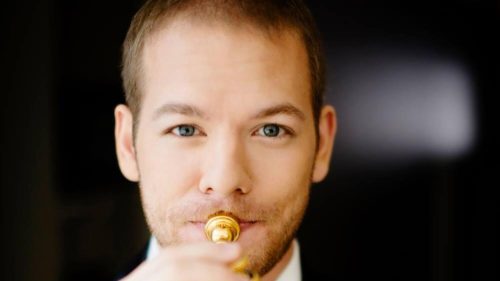By Rick Koster, Day Staff Writer | 2/2/2024

Yes, Caleb Hudson, the highly regarded orchestral trumpeter and piccolo trumpet virtuoso, is aware of “Penny Lane” by the Beatles.
But why would anyone ask him such a question?
Well, because, arguably, “Penny Lane” contains the most famous piccolo trumpet part in music history: those staccato, planet-orbiting high-note runs that constitute the solo in the middle of the song. Does Hudson find a Beatles association professionally disconcerting in the context that pieces like Bach’s Brandenburg Concerto No. 2 in F Major offer a larger historical context for piccolo trumpet displays?
“Not at all! Paul McCartney heard (the late English trumpeter) David Mason playing the Brandenburg No. 2 and that was the inspiration for the part on ‘Penny Lane.’ That’s the connection, and they brought Mason to the studio to record it,” Hudson says.
At 36, Hudson, a Juilliard graduate originally from Kentucky, is old enough and equipped with sufficient musical dexterity and scholarship to cheerfully discuss minutiae about both the Beatles and Bach. And, yes, Hudson can play both pieces. In particular, his reputation for the Bach is globally renowned. Not only did he, during a 10-year stint as a member of the elite Canadian Brass, showcase it at each of their concerts, he’s also done it with the likes of the Philadelphia Orchestra, Orpheus Chamber Orchestra, Orchestra of St. Luke’s, Israel Philharmonic Soloists, Chamber Music Society of Lincoln Center, and Handel and Haydn Society.
Doubtlessly, he’ll revisit the Brandenburg many more times.
A new focus
Presently, though, Hudson has his own debut solo album to focus on. He started work on the record during the COVID lockdown and, after leaving the Canadian Brass last year, has had time to finish it. The album is titled “Nothing Less,” and Hudson celebrates its impending release by appearing Saturday and Sunday in the latest concerts from the Musical Masterworks chamber music series in Old Lyme’s First Congregational Church.
In a bit of programming genius by Masterworks artistic director/violinist Tessa Lark, this weekend’s performances will highlight much of the “Nothing Less” album and feature most of the musicians who played on the recording. That includes Lark as well as cellist Michael Nicolas and flutist Emi Ferguson. Clarinetist Gabriel Campos Zamora will join the group onstage, filling in for Mark Dover, who was on the album sessions.
The Masterworks setlist will open with works by Telemann and Bach before the ensemble segues into material from “Nothing Less” including the four-part title track suite as well as fresh arrangements of Corelli’s Sonata No. 8 Op 5 and Satie’s Etude 6, as well as new original material from Kyle Athayde (Sylvan) and Remy Le Boeuf (Vignette Nos. 20 & 21).
“Nothing Less” is a remarkable album — a beautiful, well-played and sustained listening experience. From beginning to end, the music flows compellingly and combines evocative soundscapes with soaring instrumental polyphony. If Vaughan Williams’ ascending larks decided to dart and swirl over a Caspar David Friedrich landscape, it might sound like “Nothing Less.”
“It was important to try my best to complete an overall trajectory for the album,” says Hudson, on the phone late last week from Austin, where he now serves as an associate professor of trumpet at the University of Texas’s Butler School of Music. “I’m not sure how many albums do that anymore, or how many people listen to entire albums. But that’s how I’ve always listened to albums. Classical, jazz, back and forth. I’ve spent years curating and listening to records waiting for them to resonate.”
Shifting gears
When it came to writing and collecting material for “Nothing Less,” Hudson came to a conceptual crossroads. He originally thought the recording would represent a more traditional format with solo trumpet backed by string quartet – but ultimately shifted in a significant way.
He says, “I realized it wouldn’t be an honest record if all I was trying to do was express virtuosity. It’s not about technique; virtuosity is a tool. If you watch a great musician like Tessa, you don’t have to be trained to see the art in what she’s doing, you feel it and hear it.
“I wanted more of a collaborative feel from all the musicians, like you’d get with jazz musicians. There are moments of solo trumpet and instrumental virtuosity, but it was much more about musicians who enjoy playing with each other and sharing musical ideas. And the instrumentation — trumpet, cello, flute, violin and clarinet — suggest certain possibilities.”
Hudson says the album probably wouldn’t have been made without the COVID lockdown. The Canadian Brass are known for their heavy touring schedule, and the players he picked to work on the album are well known and in demand.
“Suddenly, we all had time, and I was so lucky they were available and willing,” Hudson says. “I’ve long admired each of them and was so thrilled they were part of it. And it was important that they all knew from the start I wanted them to offer their own viewpoints and ideas and talents in a collaborative atmosphere. I wanted that and not a situation where I was a leader. That’s why the sessions were so great. There has to be a balance between putting ideas forward but within the overarching goal.”
Connective thread
One fortuitous bit of history is involved in both “Nothing Less” and the Musical Masterworks concerts. While no one would consider rural Kentucky a hotbed of classical music, it’s nonetheless true that Hudson and Lark met when both were members of the Central Kentucky Youth Orchestra. He also grew up in a musical family where he and his siblings were required to pick and learn an instrument. Hudson heard an older student playing trumpet and, entranced by the tone, became obsessed with the horn.
As for Lark and him: As their careers rocketed, they’ve stayed in touch as friends and frequently perform together in various lineups. With that connection, Musical Masterworks and “Nothing Less” almost seem fated.
Hudson says he’s heard wonderful things about the sound and sightlines of the First Congregational Church, as well as the welcoming nature of the Masterworks audience. He says he’ll follow Lark’s charismatic onstage leadership, which combines informal wit with elegant musical sophistication.
“It’s no detriment to speak onstage in a casual fashion,” Hudson says. “When it comes to presentation, the music speaks for itself and the crowd can pick up on the genuine qualities. Tessa’s level of performance is at the highest level but never pretentious — and it obviously works in a big way.
“With ‘Nothing Less,’ I wanted to find the right people and repertoire and even the right song order to balance the music-making AND the audience’s perspective,” Hudson says. “I think we did that, and now I’m excited to get to explore that in a live setting.”


